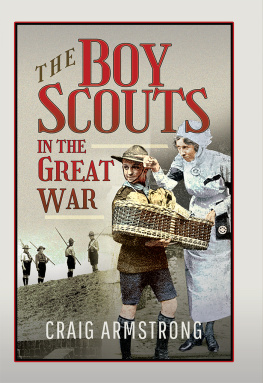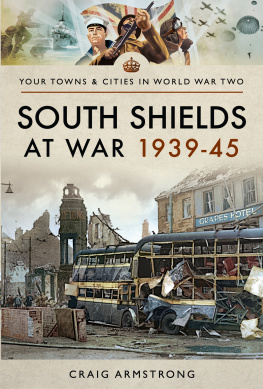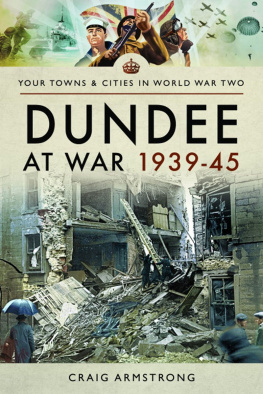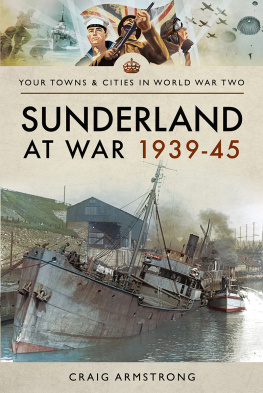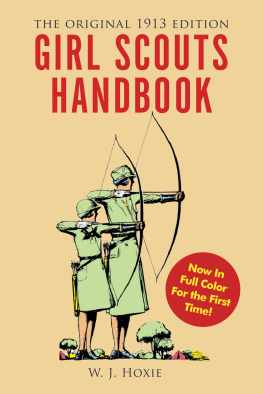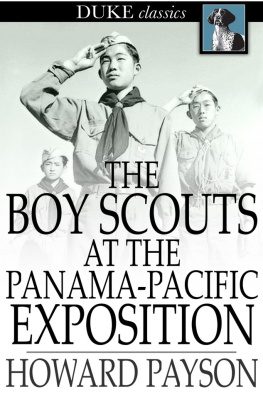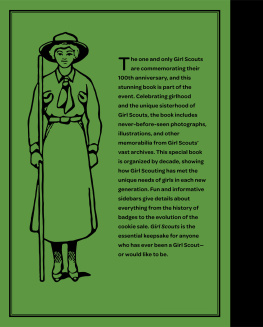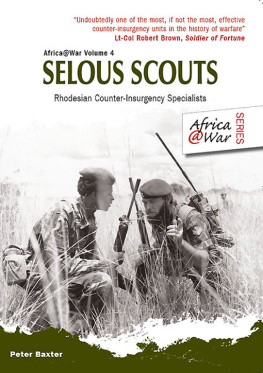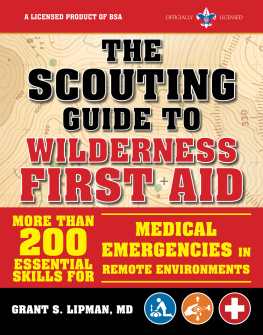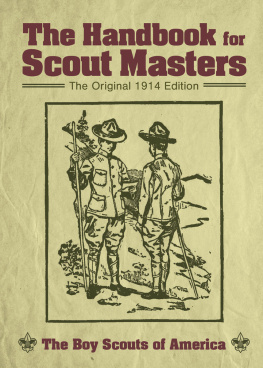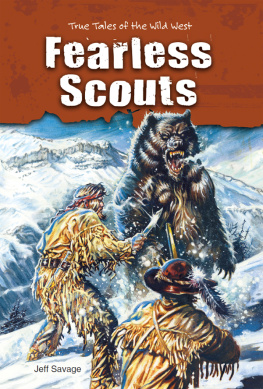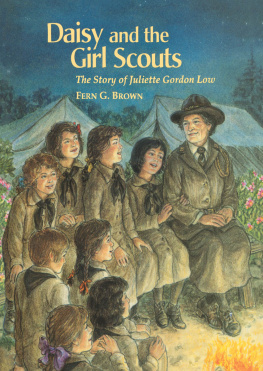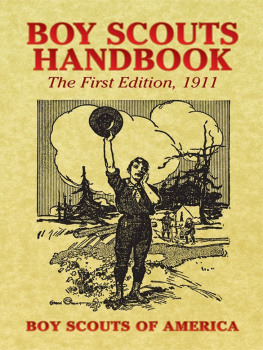Pagebreaks of the print version

THE
BOY SCOUTS
IN THE GREAT WAR
For my Parents
THE
BOY SCOUTS
IN THE GREAT WAR
CRAIG ARMSTRONG
First published in Great Britain in 2021 by
Pen & Sword Military
an imprint of
Pen & Sword Books Ltd
Yorkshire Philadelphia
Copyright Craig Armstrong, 2021
ISBN 978 1 52672 324 6
eISBN 978 1 52672 325 3
Mobi ISBN 978 1 52672 325 3
The right of Craig Armstrong to be identified as Author of this work has been asserted by him in accordance with the Copyright, Designs and Patents Act 1988.
A CIP catalogue record for this book is available from the British Library.
All rights reserved. No part of this book may be reproduced or transmitted in any form or by any means, electronic or mechanical including photocopying, recording or by any information storage and retrieval system, without permission from the Publisher in writing.
Pen & Sword Books Limited incorporates the imprints of Atlas, Archaeology, Aviation, Discovery, Family History, Fiction, History, Maritime, Military, Military Classics, Politics, Select, Transport, True Crime, Air World, Frontline Publishing, Leo Cooper, Remember When, Seaforth Publishing, The Praetorian Press, Wharncliffe Local History, Wharncliffe Transport, Wharncliffe True Crime and White Owl.
For a complete list of Pen & Sword titles please contact
PEN & SWORD BOOKS LIMITED
47 Church Street, Barnsley, South Yorkshire, S70 2AS, England
E-mail:
Website: www.pen-and-sword.co.uk
Or
PEN AND SWORD BOOKS
1950 Lawrence Rd, Havertown, PA 19083, USA
E-mail:
Website: www.penandswordbooks.com
CHAPTER 1
1914
The Home Front
The outbreak of war was met, by many people, with excitement and enthusiasm and in the early days and weeks there was a substantial rush to the colours. Across Britain, large queues of men formed outside recruitment offices as men tried to enlist. The reasons for enlisting were extremely varied. Loyalty, patriotism, a desire to escape the drudgery of life at home or at work, to escape poverty, a wish to get involved before the war ended, a view that war was the ultimate test of manhood, peer pressure, friendship, all of these and more played a role in recruitment. For older boy scouts an undoubted reason was the fact that they had been inculcated with the belief that honour, loyalty and duty to King and country was of paramount importance.
Many of those involved with the Boy Scouts Association were automatically called up anyway. Large numbers were already members of either the reserves or members of the Territorials. This denuded the association of leadership at a crucial time, but the scouts had been organised to be extremely flexible and adaptable and the associations across the country seemed to adapt with remarkable speed and skill to the situation.
Within days of the war being declared, Boy Scouts across Britain were eagerly mobilising and within three days some 50,000 Boy Scouts were said to be ready to assist the military and civilian authorities in any way required. It was not only the leaders of the organisation who were eager to throw the scouts into the fray but there was great eagerness evinced by the boys themselves with thousands of telegrams being sent to the authorities from Boy Scouts begging to be made use of.
Typical of some of the letters from younger scouts was the extract from one which was published in the Hampshire Independent on 15 August 1914. The letter to the War Office read:
I understand there is a war between England and Germany. I am a Boy Scout, aged 10, and shall be pleased to offer my services. So please send a rifle and ammunition, and when the war is over I will return the rifle and what ammunition I have left.
Quite what use would be made of the Boy Scouts during the war was a subject for some debate in the early days. There were undoubtedly some within the movement who hoped that the boys would be mobilised as a quasi-military force to aid in the protection of Britain, but there were distinct concerns over placing young boys, children, into situations where they might come into contact with danger and even with the enemy. Others wished to utilise the movement to provide a form of civilian labour which could be used to aid the many professional and voluntary groups which were mobilising to provide vital wartime necessities such as healthcare, fundraising or farm work. In the first days of the war Sir Robert Baden-Powell was called into meetings at the War Office to discuss the contribution that the Boy Scouts Association might offer to the war effort. Sir Robert quickly offered 1,000 scouts in each county to assist the Chief Constables in a variety of ways. These duties were to include: aiding communications through despatch riders and signallers; guarding various sites against spies; collecting information regarding supplies and transport capabilities; aiding relief work; helping the families of men who were employed in defence duties or the sick or wounded; establishing first aid, dressing and nursing stations along with refuges, dispensaries and soup kitchens in their club rooms; acting as guides and orderlies; and forwarding dispatches that had been dropped by aircraft.
At the outset of the war Britain had no preparations in place for the necessary tasks of guarding strategically important locations such as telephone exchanges, railway tracks, bridges and canals. Another important task was the watching of the British coastline in case of enemy raiders or attempts to land spies. These tasks were of vital importance but maintaining these guards would overstretch the already taxed British Army and the Royal Navy along with the non-military coastguard service. Very quickly the leadership of the Boy Scouts Association realised that their lads were ready-made for many of these tasks and their services were volunteered with remarkable alacrity. An anxious government gratefully accepted the offer within twenty-four hours and the scouts and sea scouts immediately began their duty. The scouts who took part in these duties did so with gleeful enthusiasm, seeing themselves as Britains second line of defence. Indeed, the experience of guard duty further encouraged many of the scouts to enlist as soon as they were able. A large number of the sea scouts who undertook coastal watches, for example, later volunteered for service with the Royal Navy.
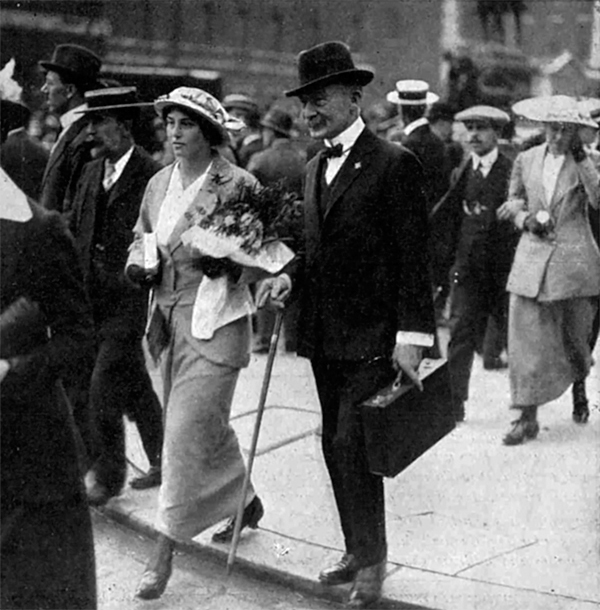
Sir Robert and Lady Baden-Powell leaving the War Office . (The Sketch)
In Nottinghamshire, the County Commissioner of Scouts, Sir Lancelot Rolleston, received a communique from Sir Robert Baden-Powell on 7 August asking for the services of 1,000 scouts to aid the authorities. Sir Lancelot was busy with his military duties and passed the request on to the chairman of the Notts. Boy Scouts Association, Mr L.O. Trivett. Mr Trivett received a second communique later that day asking for the services of more scouts to assist in the vital task of helping to gather in the harvest. To relay these messages Mr Trivett toured several towns on 7-8 August and was pleased to find enthusiasm in every location with the local scouts demonstrating a keen, loyal spirit, and an impatient desire to be of service to their country in its hour of need. The leaders of the movement in Nottinghamshire quickly mounted a recruitment campaign encouraging scouts to volunteer their services and in Newark, Mansfield, Retford and Worksop the local troops began a recruitment drive.

